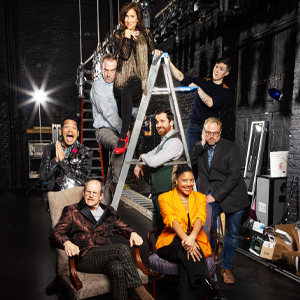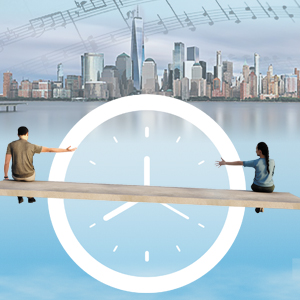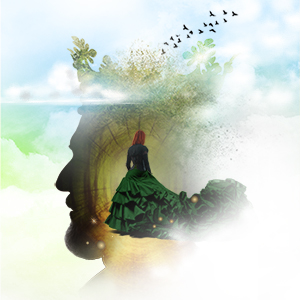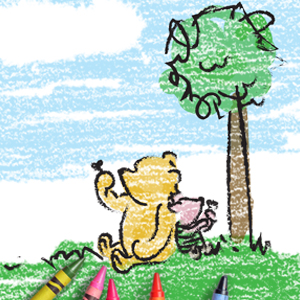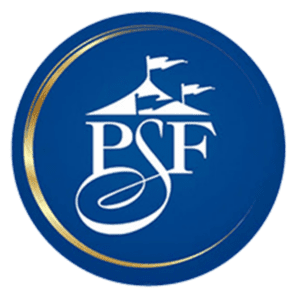Strategic Planning Retreat October 2009
Opening Speech by Producing Artistic Director Patrick Mulcahy
The year is 2030. And it’s a beautiful summer day. You live an hour and a half to the south of the Pennsylvania Shakespeare Festival, and you prepare to make your annual pilgrimage to PSF, which has emerged as the highlight of your year for a number of years now. You check to make sure you have your tickets, booked online back in November. You learned the hard way a few years back how quickly the performances sell out due to the ever-growing popularity of the Festival in the Mid-Atlantic region. You are looking forward to four productions in three days, and your favorite bed and breakfast for two nights, also booked last fall. You’re especially looking forward to dinner at a restaurant that holds very fond memories for you: your 25th Anniversary dinner during a previous visit. You drive up through Bucks County, the back route, just like last year, past old stone farmhouses and barns, streams and rolling hills, horse farms and roadside stands. You and your spouse are talking in the car about the last time you saw The Winter’s Tale, perhaps a decade ago, and how interested you are to see these particular actors, a married couple, household names, play Leontes and Hermione, after seeing him in a Broadway production once before, and her in a few major films. There has been a lot of buzz about this production in the New York Times and American Theatre magazine, as it will move to Lincoln Center, in rep with Much Ado, at the end of the season for a four-week run. In one of the articles, one of the faculty designers was featured for their work on the project.
You are both excited to see Henry V. First time for each of you. You couldn’t fit the Sondheim musical A Little Night Music into your trip but you did buy both Chekhov’s The Cherry Orchard and Much Ado About Nothing. You wanted to see the sixth play, Moliere’s The School for Wives, but it won’t run until a little later in the season. You’ll probably sneak back up to see it later on, and maybe squeeze Night Music in then. The perfect excuse for a return trip to feed your PSF habit.
You check in at your B&B, grab a quick but refreshing nap and then head to dinner. Your meal is terrific and the restaurant is abuzz with talk of the Festival. Patrons have their Festival guides out on the tables, some are flipping through the community pages looking for the exhibits at the Art Museum, the late night jazz over at SteelStacks, the gastro pubs where actor sightings are rumored, the multitude of golf courses, the shopping and antiquing, and the many historic and interpretive experiences in Bethlehem and elsewhere nearby. You take it easy on the wine at dinner, as you want to be sharp for the performance tonight. And, after all, you can always have a glass at intermission, or in the courtyard after the show. The performance you will see tonight is in the newer theatre. (We’ll call it the Schubert 2 for now), built six or seven years ago. The old tent had its own charm as the third venue, but you love this new theatre.
As you drive onto campus, you continue to marvel at the growth of the University. You drive a hundred yards past Labuda en route to the Schubert 2, and you pull into the new parking lot, nestled in some trees, and adjacent to the apartments with kitchens built by the university 15 years ago. You recognize several of the actors coming out of the apartments, heading for the theatre, including the married couple you will see tonight. They pause outside the Shakespeare Café in the courtyard to talk with some patrons. It is a perfect summer evening, a warm breeze rustles the leaves, the sun shines through a pure blue sky, and there is a feeling of ease and release here, and yet a growing sense of anticipation of the evening to come.
You have a palpable sense that this is a crowd with a deep appreciation for the classics and you notice they are as diverse as are the casts, the staff, and the audience, which has progressed marvelously in recent years.
As you move in towards the Schubert 2, picking up some souvenirs along the way, you glance back out over the campus as the glow of sunset bathes the Valley in light and shadows. This splendor presages the beauty and the complexity of the play you are about to experience. The Schubert 2 theatre (presumed for the sake of this story to be a three-season indoor/outdoor space, protected from the elements above but open to the breezes and the sounds of the natural surroundings) is a highly distinctive theatre, with side panels that can be opened or closed, open of course for a perfect evening like this. The playing space is optimally designed for Elizabethan plays, with an open thrust stage surrounded on three sides by seating that is raked along with the landscape. The roof of the building comes to a peak over the point where the audience and playing space are closest, with ample height creating a sense of majesty and grandeur, for the great tragedies that explore the interaction of man and God in the cosmos. The theatre has state of the art lighting, and the acoustics are quite good. The back panels are open as well for this production, allowing full view of the treescape to the rear of the theatre as part of the design. The leading actor and actress get a round of applause upon their entrance, in appreciation for their well-earned international fame.
The performance is sublime, and carries you aloft along with the rest of the audience on an exquisite and unforgettable journey, creating a life memory for all who are present. “The magic of live theatre.” You find yourself having sensations and feelings during the performance that seem uniquely of this moment. And during the scene set on the stormy shores of Bohemia, real rain starts to fall outside the theatre as a brief summer storm moves through, reinforcing the magic of the moment. The designs and performances are terrific, but your awareness transcends the particulars, like the finest meal or the finest wine, where the subtle blending of taste and aroma is so distinctive and savory. The words echoing inside of you: “I didn’t know this was possible. It’s so good.” The theatrical moments traverse emotional terrain that feels at once fresh and spontaneous, ancient and primal, a meeting of the newness of this unique moment with the unfathomable interplay of human experiences that Shakespeare conjured and illuminated in a previous age. Thankfully, he did so not just for an age, but for all time, and in this moment in this theatre “all time” feels a lot like now. The performance ends, but continues to work on you, an experience not unfamiliar to you here at PSF. And you sense this one will stay with you for some time.
The remainder of your stay is deeply satisfying, the transcendence of the first evening’s performance gives way to other delights and explorations, on stage and beyond. Henry V is gripping and poignant. The Cherry Orchard is perhaps the flip side of The Winter’s Tale coin, another evening of cultivated sensitivity, and yet wonderfully different with its devastating comedic insights. Much Ado is a howl, perhaps the best you’ve seen, and it was great fun to see this married pair tackle Benedick and Beatrice, especially after seeing them in the completely different roles in The Winter’s Tale the night before. You notice that the consistency of quality at PSF continues to impress you, and seems to you on par with the best of the best in leading regional theatres you have attended anywhere.
During your stay, you also attend several prologues and a backstage tour (which you confess to the tour guide you’ve done more than once before). On the tour you also hear about the thousands of students who attended several of the same performances in May in school groups, and the development of the young company, which you may be able to catch if and when you return later this season. You also learn of the residencies that the artists involved in The Winter’s Tale and Much Ado conducted with the students at DeSales in April, and the other community events in which they engaged. Also on the backstage tour, you heard about the evolution of the WillPower educational programs, the tour in the fall with Equity actors now, the three-day competition each winter for high school students, now attended by 1,500 students. You heard about the symposia and trainings the Festival offers through the course of a year’s activities.
As always, the DeSales students are fantastic. You realize now that several of them carried substantial roles in the other productions and you are deeply impressed that you had no idea they were students when you saw them in the Shakespeares. You stay after a matinee to watch some of the change over of scenery between matinee and evening shows, and then take in a pleasant meal at the Shakespeare Café in the courtyard in between.
Then you become aware that this year’s visit is drawing to a close. You purchase the remaining souvenir items you promised folks back home. You see your last performance in a matinee. You depart feeling wonderfully full, with your arrival just two days earlier a faint memory, feeling like it was a week ago. You cannot help but feel a sense of deep gratitude that such a place exists and that it is so close to your home. You can’t help but feel a sense of wonder that these experiences could work on your psyche in these ways, and that the presence of the Festival in your life is a beautiful reminder of the good things in life.
Back here now in 2009, we aim to become this world-class festival doing world-class work.
So what are we here to do? St. Francis de Sales, not unlike his contemporary William Shakespeare, saw things in a new way compared with his predecessors. I paraphrase Fr. O’Connor and probably several other Oblates here at De Sales when I share that the widely held views prior to the Renaissance were that the pathways to God lay either through the human mind or the human will. St. Francis de Sales was convinced there existed a third pathway: the human feeling structure, our sensitivity to beauty and to the great stories of humanity. The Festival is an access point to that pathway. For some it will be a pathway to God, for some a pathway to renewal and inspiration. We are here to clear and cultivate that pathway.
The famed theatre director Peter Brook spoke of theatre as aiming to make the invisible visible. As Robert Frost once said about poetry, “It is a way of remembering that which it would impoverish us to forget.” We aim to take that which is often, in the blur of daily life, invisible to us, and, by holding the mirror up to nature, to awaken our sensitivity sufficiently so that we may see, and bring that which is otherwise invisible into view. That kind of activity is now the work of this committee, this Board, this Festival. Today, this vision, hopefully captured in the story I shared with you, is now present only in our minds, and hopefully by the end of our work, in our hearts. But it is invisible, until we make it visible. But in the year 2030, it’s already there, waiting for us. We just have to get out of its way.


